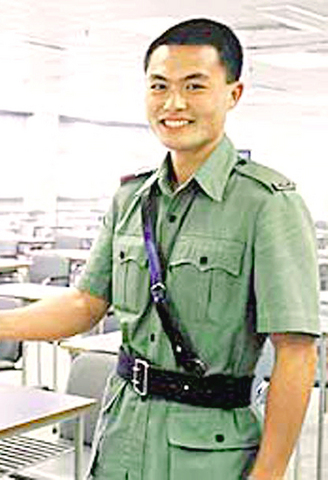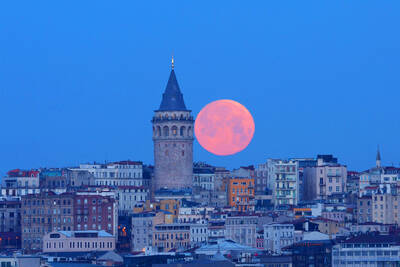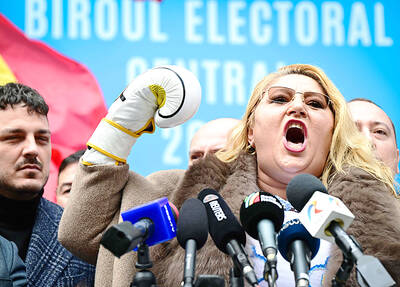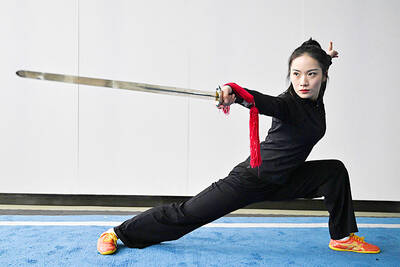He was a policeman who scored high on his academy exams. He once carried a sign saying "Democracy" in a street protest demanding more political freedom in Hong Kong. He was also a contestant on the local version of the TV game show Who Wants to be a Millionaire?
By all accounts, Tsui Po-ko (
Tsui, better known by his media nicknames "rogue policeman" and "devil cop," has been the most talked-about person in Hong Kong since the unexplained shooting that also claimed his life about a week ago.

PHOTO: AP
News of the gunfight in the blood-spattered underpass and the investigation have made front-page headlines daily for the past week. It has sparked intense speculation about whether gangsters and other shadowy figures have infiltrated the police.
Tsui, 35, was a tall, lanky man with a square jaw, a crew cut as short as peach fuzz and sweeping eyebrows that looked like the long wings of a flying bat. He was a fitness fanatic, a runner with a sinewy body like a lightweight boxer.
The policeman -- who had a wife and six-year-old daughter -- was off duty, dressed in khaki pants and a knit hat, when the shooting happened shortly after midnight on March 17 in the Tsim Sha Tsui district.
Tsui ambushed the patrolling officers as they walked down the stairs into the underpass, Lee Ka-chiu (
Investigators believe Tsui was acting alone, and his attack was meticulously planned, Lee said.
His goal was to steal guns and bullets from the two policemen, Lee said, adding that investigators were still trying to understand what motivated Tsui.
"In my 29 years of service, this is the first case which involves a suspect like this," he said.
One of the details that sparked interest was that Tsui's gun was stolen from a policeman who was shot dead while answering a bogus noise complaint in March 2001. The same gun was apparently used in the fatal shooting of a security guard during a bank robbery in December that year, Lee said.
If Tsui were alive, he could be prosecuted for the 2001 killings, Lee said.
Early speculation was that Tsui was mixed up with triads. But Lee insisted that Tsui wasn't involved with triads.
David Chan, a senior lecturer of criminology at City University of Hong Kong, said a few police may be linked to triads, but he doubted that gangsters were entrenched in the force.
He said that the police are well paid compared with others in the region.
"I'm inclined to think the Hong Kong police force is a highly professional team," he said.
Local media quickly began digging into Tsui's past and found that he was an ambitious and active man. A photograph of him was printed in the weekly Eastweek magazine, showing him marching in a recent pro-democracy protest holding a gold-framed sign saying "Democracy."
Tsui and his wife also appeared on the TV show Who Wants to be a Millionaire? in 2001. They won HK$60,000 (US$7,692) on the program, which is to be rebroadcast this weekend.
Dennis Wong, head of the criminology department at City University, said that Tsui appeared to be driven by "aggregated frustration."
He said Tsui was passed over for promotions several times over the past five years because he was reportedly deemed too aloof and not a team player.
"Tsui had all sorts of abilities. He was 6 feet [1.83m] tall. He was a good shooter. He was very muscular. He could run fast. He should have been promoted, but he wasn't because of the personality defects," he said.
Wong said that when some people can't achieve socially approved goals -- like money, status and power -- by legitimate means, they resort to illegitimate methods.
"This happened in Tsui's case. It's very clear," he said.

RARE EVENT: While some cultures have a negative view of eclipses, others see them as a chance to show how people can work together, a scientist said Stargazers across a swathe of the world marveled at a dramatic red “Blood Moon” during a rare total lunar eclipse in the early hours of yesterday morning. The celestial spectacle was visible in the Americas and Pacific and Atlantic oceans, as well as in the westernmost parts of Europe and Africa. The phenomenon happens when the sun, Earth and moon line up, causing our planet to cast a giant shadow across its satellite. But as the Earth’s shadow crept across the moon, it did not entirely blot out its white glow — instead the moon glowed a reddish color. This is because the

DEBT BREAK: Friedrich Merz has vowed to do ‘whatever it takes’ to free up more money for defense and infrastructure at a time of growing geopolitical uncertainty Germany’s likely next leader Friedrich Merz was set yesterday to defend his unprecedented plans to massively ramp up defense and infrastructure spending in the Bundestag as lawmakers begin debating the proposals. Merz unveiled the plans last week, vowing his center-right Christian Democratic Union (CDU)/Christian Social Union (CSU) bloc and the center-left Social Democratic Party (SPD) — in talks to form a coalition after last month’s elections — would quickly push them through before the end of the current legislature. Fraying Europe-US ties under US President Donald Trump have fueled calls for Germany, long dependent on the US security umbrella, to quickly

Romania’s electoral commission on Saturday excluded a second far-right hopeful, Diana Sosoaca, from May’s presidential election, amid rising tension in the run-up to the May rerun of the poll. Earlier this month, Romania’s Central Electoral Bureau barred Calin Georgescu, an independent who was polling at about 40 percent ahead of the rerun election. Georgescu, a fierce EU and NATO critic, shot to prominence in November last year when he unexpectedly topped a first round of presidential voting. However, Romania’s constitutional court annulled the election after claims of Russian interference and a “massive” social media promotion in his favor. On Saturday, an electoral commission statement

In front of a secluded temple in southwestern China, Duan Ruru skillfully executes a series of chops and strikes, practicing kung fu techniques she has spent a decade mastering. Chinese martial arts have long been considered a male-dominated sphere, but a cohort of Generation Z women like Duan is challenging that assumption and generating publicity for their particular school of kung fu. “Since I was little, I’ve had a love for martial arts... I thought that girls learning martial arts was super swaggy,” Duan, 23, said. The ancient Emei school where she trains in the mountains of China’s Sichuan Province